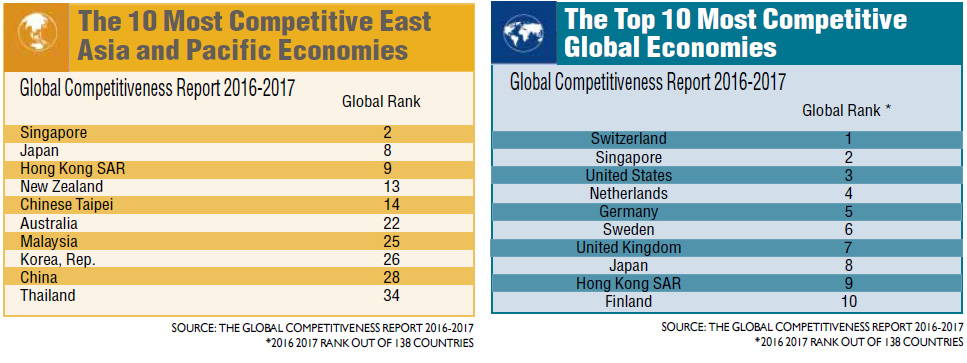PH slips in global competitiveness ranking
The Philippines fell 10 notches in the World Economic Forum’s Global Competitiveness Report 2016-2017 to rank 57th out of the 138 economies assessed.
This was the first time in a decade that the country slipped in the said competitiveness ranking.
Based on the latest report, the Philippines saw a decline in seven of the 12 pillars used to determine the competitiveness of economies covered. These are institutions, infrastructure, goods market efficiency, labor market efficiency, technological readiness, business sophistication and innovation.
“The country appears to be going backwards vis a vis its peers in some of the more complex areas of competitiveness. Its technological readiness ranking falls 15 places to 83rd; business sophistication drops 10 (places) to 52nd, and innovation falls 14 (places) to 62nd,” WEF said.
“The country’s goods market efficiency rank goes down 19 places to 99th. Entrepreneurs noted that the Philippines is the second lowest ranking country in the world when it comes to the number of procedures to start a business.”
WEF said the most problematic factors in doing business in the Philippines were its inefficient government bureaucracy; inadequate infrastructure; corruption; tax rates, and tax regulations.
WEF also cited the country’s political instability and restrictive labor regulations.
The only bright spots for the Philippines in the Global Competitiveness Report 2016-2017 were in the macroeconomic environment pillar, where it rose four notches to 20th place; health and primary education, up five notches to 81st, and higher education and training, up to 58th.
Switzerland ranked the most competitive economy for the eighth consecutive year, ahead of Singapore and the United States. According to WEF, the latest survey results showed a 10-year decline in the openness of economies at all stages of development, which posed risks to countries’ ability to grow and innovate.
The Global Competitiveness Report 2016-2017 is an annual assessment of the factors driving productivity and prosperity in 138 countries. The degree to which economies are open to international trade in goods and services is directly linked to both economic growth and a nation’s innovative potential, WEF said.

The competitiveness gap in East Asia and Pacific, meanwhile, is widening, according to WEF.
“Although 13 of the 15 economies covered consecutively since 2007 have been able to improve their GCI score over the past decade, this year sees reversals for some of the larger emerging markets in the region: Malaysia drops out of the top 20, falling seven places to 25th place; Thailand drops two notches to 34th; Indonesia falls four places to 41st, while the Philippines drops 10 places to 57th. A consistent theme for all the region’s developing countries is the need to make inroads into the more complex areas of competitiveness related to business sophistication and innovation if they are to break out of the middle-income trap,” WEF said.